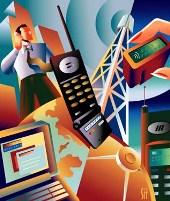 In response to the consultation paper issued by the Telecom Regulatory Authority of India on Friday, direct-to-home operators said the proposed interoperability of set-top boxes faced serious limitations.
In response to the consultation paper issued by the Telecom Regulatory Authority of India on Friday, direct-to-home operators said the proposed interoperability of set-top boxes faced serious limitations.
"There are issues, as older operators like Dish TV and TATA Sky use the MPEG-2 technology, while new operators use MPEG-4. So, as of today, interoperability does not look like a feasible option," said the managing director of a DTH company on condition of anonymity.
MPEG is a file compression methodology. While both MPEG-2 and MPEG-4 are widely used, latter has additional features.
In the consultation paper, Trai sought recommendations from stakeholders to check the possibility of manufacturing STBs that can ensure technical compatibility and effective interoperability among DTH operators.
The regulator sought suggestions on how interoperability could be implemented in the DTH industry and what would be its likely impact on service providers.
Stakeholders have been requested to offer suggestions by September 7 and counter-comments by September 12.
Operators said, in the present context, interoperability in DTH was virtually impossible. "In the next 18-24 months, we might see some changes, as Telecom Regulatory of Authority of India is serious about interoperability. There is a software available, CAM, which can make interoperability possible.
But, it is an expensive proposition and costs around Rs 1,500.
Since DTH players already subsidise STBs, the software will add to their cost burden, which will eventually be passed on to the subscriber," said the chief marketing officer of a leading DTH player requesting anonymity.
Industry watchers say there are other operational issues as well. While some companies (like TATA Sky) sell STBs, others (like Dish TV) rent it. So, subscribers might find it difficult to change the service provider while retaining STBs.
"Trai's suggestion is on the premise that subscribers should not be forced to consume shoddy services and should have an exit option. However, technology is an exit barrier in this particular case," said Devendra Parulekar, partner, media and entertainment practice, Ernst & Young.
"Trai's suggestion on mobile number portability was also in the same spirit. If a consumer is unhappy with his service provider, he can move to a different operator.
"Moreover, unlike DTH, mobile operators mostly use the GSM technology universally. But in DTH, not only there are issues of mismatch in technologies between the older and newer players, there are differences in the technology of newer players also.
"For example, both Airtel DTH and BIG DTH use the MPEG-4 technology, but the former uses DVBS2 and the latter uses DVBS1," said Parulekar.
Trai has fixed October 31 as the deadline for mobile number portability after mobile operators could not match the earlier deadlines fixed by the regulator.
Operators said interoperability was a reality that could not be put on the backburner, but Trai should not hastily enforce it.
"Though the DTH industry has grown at a rapid pace, companies are still making losses. Any enforcement like this will put additional burden," said MD of the DTH company quoted above. At present, there are over 20 million DTH subscribers in the country.
The consultation paper was issued on Friday after the Information and Broadcasting Ministry, on May 11, asked Trai to review its recommendations, Interoperability and other issues relating to DTH, made on January 30, 2008.
Trai has mentioned in the consultation paper that in a scenario where technical interoperability cannot be achieved on the DTH platform, stakeholders should offer suggestions on alternative mechanisms that can be put in place to safeguard the interests of consumers.






